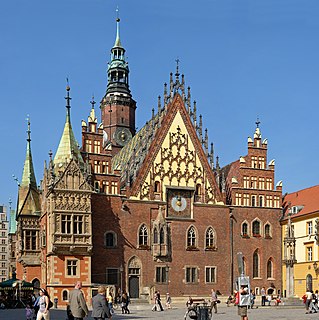| Chałupki | |
|---|---|
| Village | |
| Coordinates: 50°29′19″N16°59′42″E / 50.48861°N 16.99500°E | |
| Country | |
| Voivodeship | Lower Silesian |
| County | Ząbkowice Śląskie |
| Gmina | Kamieniec Ząbkowicki |
Chałupki [xaˈwupki] (German : Neuhaus) is a village in the administrative district of Gmina Kamieniec Ząbkowicki, within Ząbkowice Śląskie County, Lower Silesian Voivodeship, in south-western Poland. [1] Prior to 1945 it was in Germany.

German is a West Germanic language that is mainly spoken in Central Europe. It is the most widely spoken and official or co-official language in Germany, Austria, Switzerland, South Tyrol (Italy), the German-speaking Community of Belgium, and Liechtenstein. It is also one of the three official languages of Luxembourg and a co-official language in the Opole Voivodeship in Poland. The languages which are most similar to German are the other members of the West Germanic language branch: Afrikaans, Dutch, English, the Frisian languages, Low German/Low Saxon, Luxembourgish, and Yiddish. There are also strong similarities in vocabulary with Danish, Norwegian and Swedish, although those belong to the North Germanic group. German is the second most widely spoken Germanic language, after English.
Gmina Kamieniec Ząbkowicki is a rural gmina in Ząbkowice Śląskie County, Lower Silesian Voivodeship, in south-western Poland. Its seat is the village of Kamieniec Ząbkowicki, which lies approximately 8 kilometres (5 mi) south-east of Ząbkowice Śląskie, and 68 kilometres (42 mi) south of the regional capital Wrocław.

Ząbkowice Śląskie County is a unit of territorial administration and local government (powiat) in Lower Silesian Voivodeship, south-western Poland. It came into being on January 1, 1999, as a result of the Polish local government reforms passed in 1998. The county covers an area of 801.75 square kilometres (309.6 sq mi). Its administrative seat is Ząbkowice Śląskie, and it also contains the towns of Ziębice, Złoty Stok and Bardo.
It lies approximately 10 kilometres (6 mi) south-east of Kamieniec Ząbkowicki, 17 kilometres (11 mi) south-east of Ząbkowice Śląskie, and 71 kilometres (44 mi) south of the regional capital Wrocław.

Kamieniec Ząbkowicki is a village in Ząbkowice Śląskie County, Lower Silesian Voivodeship, in south-western Poland. It is the seat of the administrative district (gmina) called Gmina Kamieniec Ząbkowicki. The village is an important railroad junction, located on the main line which links Wrocław with Kłodzko and Prague. In Kamieniec, this route crosses with the west-east connection from Jaworzyna Śląska to Kędzierzyn-Koźle.

Wrocław is a city in western Poland and the largest city in the historical region of Silesia. It lies on the banks of the River Oder in the Silesian Lowlands of Central Europe, roughly 350 kilometres (220 mi) from the Baltic Sea to the north and 40 kilometres (25 mi) from the Sudeten Mountains to the south. The population of Wrocław in 2018 was 639,258, making it the fourth-largest city in Poland and the main city of Wrocław agglomeration.







